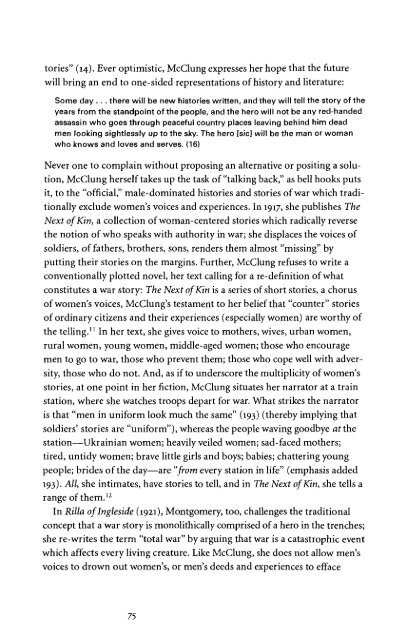Jean Rivard - University of British Columbia
Jean Rivard - University of British Columbia
Jean Rivard - University of British Columbia
You also want an ePaper? Increase the reach of your titles
YUMPU automatically turns print PDFs into web optimized ePapers that Google loves.
tories" (14). Ever optimistic, McClung expresses her hope that the future<br />
will bring an end to one-sided representations <strong>of</strong> history and literature:<br />
Some day . . . there will be new histories written, and they will tell the story <strong>of</strong> the<br />
years from the standpoint <strong>of</strong> the people, and the hero will not be any red-handed<br />
assassin who goes through peaceful country places leaving behind him dead<br />
men looking sightlessly up to the sky. The hero [sic] will be the man or woman<br />
who knows and loves and serves. (16)<br />
Never one to complain without proposing an alternative or positing a solution,<br />
McClung herself takes up the task <strong>of</strong> "talking back," as bell hooks puts<br />
it, to the "<strong>of</strong>ficial," male-dominated histories and stories <strong>of</strong> war which traditionally<br />
exclude women's voices and experiences. In 1917, she publishes The<br />
Next <strong>of</strong> Kin, a collection <strong>of</strong> woman-centered stories which radically reverse<br />
the notion <strong>of</strong> who speaks with authority in war; she displaces the voices <strong>of</strong><br />
soldiers, <strong>of</strong> fathers, brothers, sons, renders them almost "missing" by<br />
putting their stories on the margins. Further, McClung refuses to write a<br />
conventionally plotted novel, her text calling for a re-definition <strong>of</strong> what<br />
constitutes a war story: The Next <strong>of</strong> Kin is a series <strong>of</strong> short stories, a chorus<br />
<strong>of</strong> women's voices, McClung's testament to her belief that "counter" stories<br />
<strong>of</strong> ordinary citizens and their experiences (especially women) are worthy <strong>of</strong><br />
the telling. 11 In her text, she gives voice to mothers, wives, urban women,<br />
rural women, young women, middle-aged women; those who encourage<br />
men to go to war, those who prevent them; those who cope well with adversity,<br />
those who do not. And, as if to underscore the multiplicity <strong>of</strong> women's<br />
stories, at one point in her fiction, McClung situates her narrator at a train<br />
station, where she watches troops depart for war. What strikes the narrator<br />
is that "men in uniform look much the same" (193) (thereby implying that<br />
soldiers' stories are "uniform"), whereas the people waving goodbye af the<br />
station—Ukrainian women; heavily veiled women; sad-faced mothers;<br />
tired, untidy women; brave little girls and boys; babies; chattering young<br />
people; brides <strong>of</strong> the day—are "from every station in life" (emphasis added<br />
193). All, she intimates, have stories to tell, and in The Next <strong>of</strong> Kin, she tells a<br />
range <strong>of</strong> them. 12<br />
In Rilla <strong>of</strong>lngleside (1921), Montgomery, too, challenges the traditional<br />
concept that a war story is monolithically comprised <strong>of</strong> a hero in the trenches;<br />
she re-writes the term "total war" by arguing that war is a catastrophic event<br />
which affects every living creature. Like McClung, she does not allow men's<br />
voices to drown out women's, or men's deeds and experiences to efface<br />
75

















